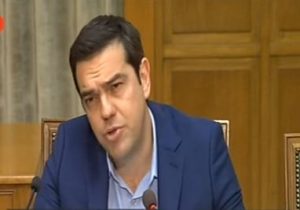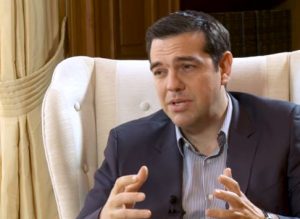ATHENS, Hellenic Republic. Prime Minister Alexis Tsipras has urged Greeks to vote “no” in Sunday’s referendum after saying he would accept a bailout offer with several conditions.
In a televised address to the nation, Mr Tsipras said a “no” vote would not push Greece out of the Eurozone, but rather win a better bailout deal.
“There are those who insist on linking the result of the referendum with the country’s future in the euro,” he said.
“They even say I have a so-called secret plan to take the country out of the EU if the vote is “no”. They are lying with the full knowledge of that fact.
“No means powerful pressure for a financial agreement that will give a solution to the debt … an agreement that is socially just.”
Mr Tsipras said Europe must stop acting in an “undemocratic way” and sought to reassure Greeks that their bank deposits were safe.
The speech came after he wrote to creditors saying that Greece will accept terms by the European Commission on Sunday but with a number of amendments.
Eurozone finance ministers have agreed to wait for the result of Greece’s referendum before holding any more talks on the debt crisis.
“We see no grounds for further talks at this point,” said eurogroup chairman Jeroen Dijsselbloem.
Greece wants to keep a reduced level of VAT for its islands, reduce the size of cuts to its military budget and delay the phasing out of a supplement for some retired people.
Mr Tsipras previously rejected conditions that the creditors wanted Greece to meet in exchange for further bailouts.
Germany, the largest single contributor to Greece’s bailout, said the proposal was not good enough.
Before the Eurozone meeting, Chancellor Angela Merkel told the German parliament: “We will wait for the referendum. There can be no negotiations on a new aid programme before the referendum.”
French President Francois Hollande had urged an accord before then, saying it was the responsibility of other countries that use the shared currency to keep Greece in the Eurozone.
He said: “We have to be clear. An accord is for right now, it will not be put off. If it doesn’t happen, we would have to wait for a referendum, but there is always a risk of turbulence and a leap into the void.”
Sky’s Katie Stallard said the “yes” camp – which would agree to the creditor’s proposal despite short-term austerity measures – is gaining ground.
She added that as Greeks faced the reality of queuing up outside cash points, they were “afraid and anxious” about what a “no” vote would mean.
There is confusion over whether the latest proposal relates to the bailout deal that has already expired or a deal relating to a later tranche of funds due to become available shortly.
If a deal is to be reached, Mr Tsipras wants to keep VAT in the Greek islands at 16%, compared to the level on the mainland at 23%.
The discount is in place to account for the added cost to residents of goods being shipped off shore, but could increase costs for tourists if abolished.
He also wants the EKAS scheme phased out more slowly. Under Mr Tsipras’ plan, the variable supplement that gets paid to pensioners to bring their monthly income up to €700, would continue to be paid to the richest 20% for longer.
The original deal asked for EKAS to be phased out for the richest fifth immediately, with it being phased out for all pensioners by 2019.
The letter also asked for a delay to an extension of individual business income tax, and a smaller cut in the military budget.
Financial markets reacted positively to the developments initially, with all the major stock markets regaining some of the ground lost this week.
The euro climbed against sterling, but investors remained cautious.
At a news conference to outline the Bank of England’s latest Financial Stability Report, its governor Mark Carney warned the outlook for UK financial stability had “worsened” because of the crisis in Greece.
Credit: Sky News


